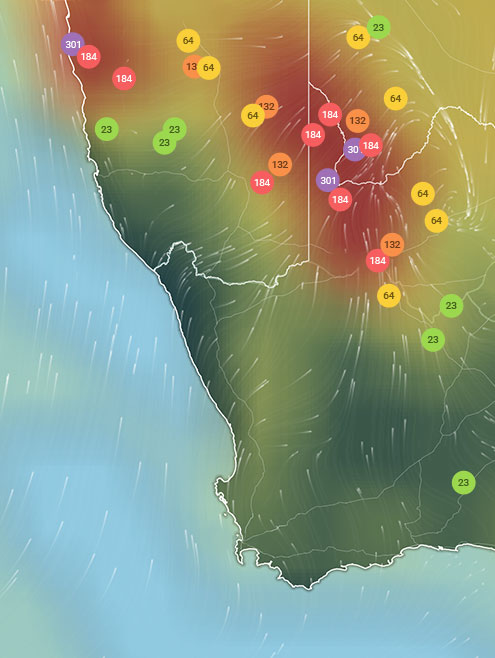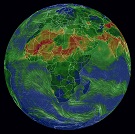Get a monitor and contributor to air quality data in your city.
1.4K people follow this city






AIR QUALITY DATA CONTRIBUTORS
Find out more about contributors and data sources| Index | Low | ||
| Tree pollen | Low | ||
| Grass pollen | Low | ||
| Weed pollen | None |
| Weather | Scattered clouds |
| Temperature | 82.4°F |
| Humidity | 72% |
| Wind | 9.2 mp/h |
| Pressure | 29.9 Hg |
| # | city | US AQI |
|---|---|---|
| 1 | Porterville, California | 80 |
| 2 | Visalia, California | 80 |
| 3 | San Antonio, Texas | 77 |
| 4 | San Gabriel, California | 77 |
| 5 | Culver City, California | 76 |
| 6 | Anchorage, Alaska | 75 |
| 7 | Bakersfield, California | 75 |
| 8 | Beverly Hills, California | 74 |
| 9 | Redondo Beach, California | 74 |
| 10 | Boerne, Texas | 73 |
(local time)
SEE WORLD AQI RANKING
| # | station | US AQI |
|---|---|---|
| 1 | Lake Arlington | 61 |
| 2 | Everest Lane | 51 |
(local time)
SEE WORLD AQI RANKINGUS AQI
55
live AQI index
Moderate
| Air pollution level | Air quality index | Main pollutant |
|---|---|---|
| Moderate | 55 US AQI | PM2.5 |
| Pollutants | Concentration | |
|---|---|---|
| PM2.5 | 14.2µg/m³ | |
PM2.5
x2.8
PM2.5 concentration in Arlington is currently 2.8 times the WHO annual air quality guideline value
| Sensitive groups should reduce outdoor exercise | |
| Close your windows to avoid dirty outdoor air GET A MONITOR | |
| Sensitive groups should wear a mask outdoors GET A MASK | |
| Sensitive groups should run an air purifier GET AN AIR PURIFIER |
| Day | Pollution level | Weather | Temperature | Wind |
|---|---|---|---|---|
| Monday, Apr 15 | Good 26 AQI US | 86° 69.8° | ||
| Tuesday, Apr 16 | Moderate 52 AQI US | 82.4° 69.8° | ||
| Wednesday, Apr 17 | Moderate 52 AQI US | 82.4° 64.4° | ||
| Today | Moderate 55 AQI US | 82.4° 64.4° | ||
| Friday, Apr 19 | Moderate 52 AQI US | 71.6° 53.6° | ||
| Saturday, Apr 20 | Moderate 52 AQI US | 64.4° 50° | ||
| Sunday, Apr 21 | Good 41 AQI US | 57.2° 50° | ||
| Monday, Apr 22 | Good 22 AQI US | 66.2° 50° | ||
| Tuesday, Apr 23 | Good 33 AQI US | 75.2° 57.2° | ||
| Wednesday, Apr 24 | Moderate 64 AQI US | 77° 64.4° |
Interested in hourly forecast? Get the app
Arlington is a city located in the U.S state of Texas, within Tarrant County. This county is the third most populous within Texas, and the city of Arlington finds itself as the second largest city in the county, as well as the 49th most populous throughout the United States. Arlington is home to some 398 thousand inhabitants, and also to major higher education learning facilities such as the University of Texas, as well as many automobile assembly plants.
With a large population, coupled with its growing industries and preexisting production lines mainly revolving around industrial items, Arlington would be subject to multiple sources of pollution that cause the air quality to be affected, which can have negative consequences for both the environment, as well as the health of its citizens. In early 2021, Arlington came in with PM2.5 readings as high as 21.6 μg/m³, recorded in the latter period of March. This reading was recorded in the late afternoon, typically when there is a large amount of anthropogenic activity occurring, with many people moving in and out of the city on their daily commutes.
This is a very high reading that would place Arlington into the ‘moderate’ pollution ratings bracket, which requires a PM2.5 reading of anywhere between 12.1 to 35.4 μg/m³ to be classified as such. Whilst this was on the higher end of the scale, with many readings coming in significantly cleaner (going down to as low as 1.1 μg/m³, a reading that is within the World Health Organizations target goal), it stands to reason that with large fluctuations of pollution occurring, there is much that could be done to improve the air quality levels in Arlington, and thus prevent its citizens from incurring the potentially negative side effects of such a high level of pollution exposure.
Arlington, as with many cities across Texas, would have multiple sources of pollution coming together to form compounded instances of higher PM2.5 readings, as were displayed in the previous question. Some are more chronic, or even ambient in their nature, with sources such as vehicular emissions being ones that occur throughout the course of the entire year, raising the PM2.5 average due to their incessant use. There would be others that are more acute in nature, such as a forest fire occurring somewhere within the state, and depending on the wind direction, potentially blowing large clouds of smoke and dangerous particulate matter directly over the city.
To recap on vehicles, the large number of vehicles owned by the inhabitants of Arlington would see the use of countless numbers of cars, motorbikes and other personal vehicles on the road at any given time. These also put out many chemicals and other polluting agents, and to compound the situation further, there would be larger, or ‘heavy duty’ vehicles sharing the roads, typically used to import and export industrial goods and other related items. These often run on diesel fuel, and due to their great size, can put out far greater amounts of pollution.
Other causes of air pollution in Arlington include emissions from factories, power plants and similar industrial areas (that see combustion taking place), as well as other seemingly innocuous sources such as construction sites or even road repairs. These can throw large amounts of finely ground particulate matter into the air, being a much larger source of dangerous PM2.5 and PM10 particles than many people are aware of. These are amongst some of the main sources of air pollution in Arlington.
The numerous health risks that come along with breathing polluted air are ones typically associated with respiratory or cardiovascular problems, although there are many areas of the body that can be affected due to the insidious nature of pollution, particularly in regards to fine particulate matter. Instances of dry coughs, chest pains and infections of the respiratory tract can occur, as well as elevated risks of developing cancer. Irritation to the mucous membranes can also happen, with the eyes, ears, nose and mouth all being affected, as well as the skin being prone to rashes and aggravated breakouts, with conditions such as eczema, psoriasis and atopic dermatitis all being possible.
Other conditions would be ones such as pneumonia, bronchitis, emphysema and aggravated forms of asthma, all of which fall under the chronic obstructive pulmonary disorder (COPD) bracket. Due to the incredibly small size of PM2.5 particles (which can go down to sizes of 0.001 microns and beyond), they can enter into the bloodstream via the lungs, causing damage to the blood vessels, heart tissue, as well as travelling to the liver and kidneys and causing both hepatic and renal failure. Even the reproductive health of individuals can be affected, showing just how much of a far reach that air pollution can have on those who are exposed to it.
With much of its pollution sources typically related to combustion (with engine vehicles, factory or power plant boilers and even firewood or forest fires all being combustion sources), many of the pollutants arise from such occurrences. These include ones such as nitrogen dioxide (NO2) as well as sulfur dioxide (SO2), both of which find a majority of their release from vehicles, with NO2 being the main offender here. Both can contribute to instances of acid rain, as well as causing inflammation to the lining of the lungs and triggering off the aforementioned respiratory problems such as asthma.
Other salient pollutants would be ones such as carbon monoxide (CO), polycyclic aromatic hydrocarbons (PAH’s) and ozone (O3), which is formed from various other pollutants, gases and the different oxides of nitrogen (NOx) coming into contact with large amounts of solar radiation, thus converting into ozone, or smog as it is better known when it accumulates in large amounts.
For those who wish to take extra care to shield themselves from the ill effects of pollution exposure, it is important to be aware of who is the most at risk to polluted air, and take preventative measures accordingly. These groups who are most vulnerable would be ones such as the elderly, pregnant mothers, young children, those with compromised immune systems or poor health conditions, as well as those with hypersensitivity towards certain chemical compounds. These groups should take extra care to avoid exposure to higher episodes of pollution whenever possible.
2Contributors
2 Anonymous Contributors

2 stations
1 Data source